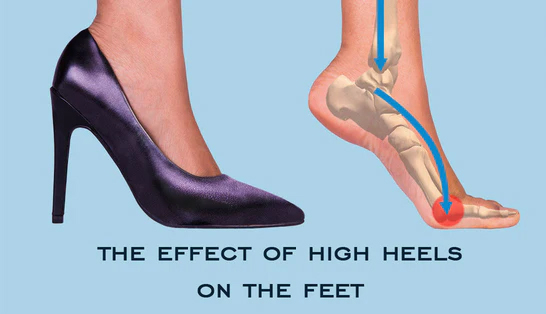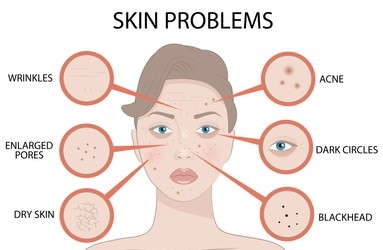
Fashion has always been a powerful form of self-expression, allowing individuals to showcase their creativity, personality, and identity. Women, in particular, have long been associated with fashion and the ever-changing trends that dominate the industry. While fashion undoubtedly plays a significant role in shaping cultural norms and empowering women, it is essential to recognize that it can also have detrimental effects on their physical and mental well-being. Behind the glamour and allure of fashion lies a darker side that often goes unnoticed – the impact it can have on women's health. This article aims to shed light on how fashion choices and trends can influence women's physical and mental well-being, examining various aspects such as body image, clothing materials, footwear, and accessories.
The fashion industry often sets unrealistic and narrow beauty standards, glorifying a particular body type that is unattainable for most women. Constant exposure to these idealized images can lead to body dissatisfaction, low self-esteem, and the development of eating disorders such as anorexia and bulimia.
The emphasis on clothing sizes can create a sense of inadequacy among women, leading to body shaming and unhealthy behaviors like crash dieting or excessive exercise. Ill-fitting clothes can also contribute to discomforts and physical health issues, such as restricted blood circulation or poor posture.

Women's footwear choices often prioritize style over comfort and functionality, leading to various musculoskeletal problems. High heels, for instance, can cause foot deformities like bunions, hammertoes, plantar fasciitis, corns, calluses, and even chronic pain. They also alter the natural alignment of the body, increasing the risk of ankle sprains, knee pain, and lower back pain. Additionally, flats and flip-flops provide minimal arch support, leading to conditions such as flat feet and Achilles tendonitis. It is crucial to strike a balance between fashion and footwear that prioritizes foot health to prevent long-term damage.

Tight clothing, such as skinny jeans, shapewear, or constricting undergarments, can lead to circulation issues, including restricted blood flow, compressed nerves, and digestive problems. Long-term wear of such garments may contribute to the development of varicose veins and deep vein thrombosis.
The choice of clothing materials directly impacts women's skin health. Synthetic fabrics like polyester, nylon, and acrylic, commonly used in fast fashion, hinder proper ventilation, trapping moisture and heat against the skin. This can result in skin irritations, rashes, and even fungal infections. Additionally, the chemicals used in textile production, such as dyes and finishes, can cause allergic reactions and skin sensitivities. Wearing tight-fitting clothes made from non-breathable fabrics can also contribute to the development of conditions like yeast infections and acne because they do not allow the skin to breathe adequately.
While accessories and jewelry can enhance an outfit, they can also pose health risks to women. Metal allergies are common among individuals, and nickel, a common component in many accessories can cause allergic reactions ranging from mild irritation to severe dermatitis. Furthermore, heavy earrings or necklaces can strain the neck and shoulders, leading to muscle tension and headaches. Wearing tight-fitting accessories, like wristbands or belts, can impede circulation and cause discomfort. It is essential to choose hypoallergenic materials and practice moderation when wearing accessories to minimize potential health hazards.

Cosmetics play a significant role in the fashion industry, but their prolonged and excessive use can have adverse effects on women's skin health. Heavy makeup, chemical-laden products, and improper skincare routines can lead to skin irritations, allergies, and even long-term damage. Additionally, the desire to achieve a tanned complexion often leads to excessive sun exposure, increasing the risk of skin cancer. Educating women about safe cosmetic practices and encouraging the use of natural and organic alternatives can help protect their skin health.
The constant pressure to keep up with fashion trends, coupled with the fear of being judged for not conforming to societal expectations, can contribute to increased stress and anxiety levels among women. The fear of being seen as “unfashionable” or “outdated” can lead to self-doubt and a negative impact on mental health.
Social media platforms and fashion magazines often perpetuate a culture of perfectionism and comparison, making it challenging for women to feel satisfied with their appearance. The relentless pursuit of flawlessness can result in body dysmorphia, depression, and other mental health disorders.
The rise of fast fashion has had profound implications for the environment. The constant production of cheap, disposable clothing contributes to pollution, excessive waste, and exploitation of natural resources. Women, being the primary consumers of fashion, are indirectly contributing to these issues by fueling the demand for fast fashion products.
The production of textiles involves the use of various chemicals, such as dyes, bleaches, and flame retardants. Prolonged exposure to these chemicals can have adverse effects on women’s health, including skin allergies, respiratory problems, and hormonal disruptions.
Fashion undoubtedly holds a significant influence over women's lives. While it has the power to boost confidence and self-expression, it is essential to recognize the potential health consequences that can arise from fashion choices. By promoting awareness, education, and the adoption of healthier fashion practices, we can create a fashion industry that prioritizes both style and well-being. Women deserve to feel comfortable, confident, and healthy in their fashion choices, and it is our collective responsibility to ensure that fashion does not compromise their physical and mental well-being. Let us strive for a fashion-forward world that empowers women to embrace their individuality while safeguarding their health and happiness.
Copyright © 2023 Trends In News - All Right Reserved